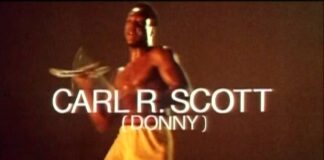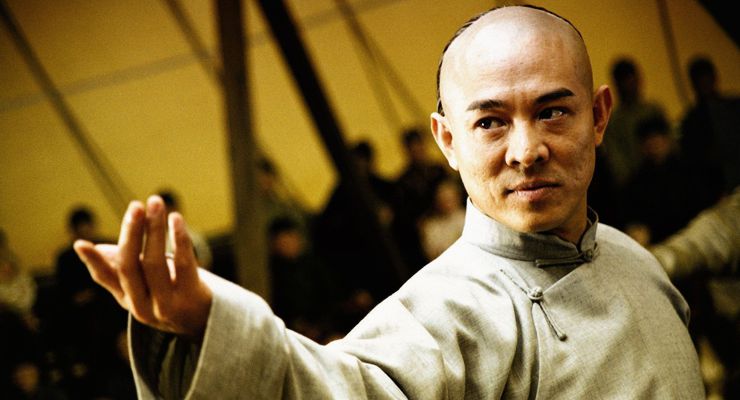
As I was watching FEARLESS, it suddenly struck me what the film was really about. Certainly the movie contains all the virtues of a classic martial arts film – the training of mind, body and soul, overcoming adversity by realizing that, ultimately, we are responsible for our own problems, and martial arts is one path leading to understanding and resolution… Yet when you view the opening scene – with five fighters from different countries and with different styles, all gathered in China for a competition motivated by pride rather than money – you realize that maybe something else is being said here. When I spoke with Jet Li last week by phone, I tossed him my take on the film – that it was a metaphor for China’s upcoming 2008 Olympic Games.
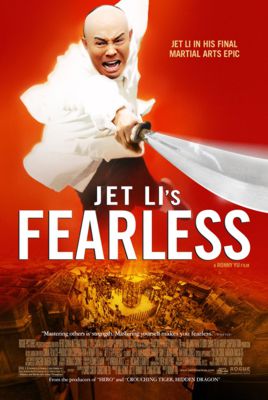 After a moment of silence, Li says, “You are the only one so far that has got it. We all say that characters can be on a warrior’s journey, but for Huo it’s an athlete’s journey, where all his training comes down to a moment in a competition, like in the Olympics. Also, at the games, being a gold medal winner doesn’t necessarily mean one is a hero, but the hero comes from those that give it their best for themselves and for their country. That is the victory; that is the hero. It’s not that I’m a five-time champion of wushu that is important, but the spirit that I tried, the spirit I participated and did my best.”
After a moment of silence, Li says, “You are the only one so far that has got it. We all say that characters can be on a warrior’s journey, but for Huo it’s an athlete’s journey, where all his training comes down to a moment in a competition, like in the Olympics. Also, at the games, being a gold medal winner doesn’t necessarily mean one is a hero, but the hero comes from those that give it their best for themselves and for their country. That is the victory; that is the hero. It’s not that I’m a five-time champion of wushu that is important, but the spirit that I tried, the spirit I participated and did my best.”
When asked if he thought wushu’s failure to become part of the 2008 Beijing Olympics would convince more people to practice the old-style traditional martial arts, he says, “I don’t know. I always argue with martial arts masters in China. They want to keep the traditional-traditional martial arts and believe that is the true martial art. But I always say, ‘Whichever martial art is beneficial to mankind, it will continue to be preserved. Whichever martial art is not, it will fade away.’ This is my belief.
“Think about it. In the old days, if you practice iron palm for three years, you become a specialist, like a college graduate; then you can go around the world of jiang hu and earn a living. But today, who goes up into the mountain for three to five years and does this? You can’t hit anyone or hurt someone because you’ll break the law. All you can do is hold up your hand and say, ‘Hey, look, I have iron palm.’ You may as well use those three years to study the computer. It’s all about human survival.
“Nowadays wushu has four uses: sport; health; self-defense or police and bodyguard work; and entertainment. These four directions are useful in our lives, so people will spend time practicing them for these reasons. Again, what is not useful won’t help, so it will just fade away. We’ll see how the Olympics decision affects these things.” To further drive home the salute to the Olympics, the film’s original opening and ending scenes feature Michelle Yeoh portraying an official of the Olympic Committee named Ms. Yang. Director Ronny Yu told KungFuMagazine.com last week, “Yes, Michelle was actually the film’s bookends, and essentially the story is really being told through her perspective where we open with her actually telling people about this man named Huo Yuan-jia who taught wushu as a sport about 100 years ago. This will all be in the director’s cut. We actually removed 27 minutes of film because – at the end of the day – every decision you make has to be for the good of the film, but then you realize some scenes are repetitive where whatever you want to say, you’ve already said it. Other removed scenes include a Thai fighter bout and how Huo teaches his students. The cuts aren’t obvious, and it helped the pacing of the film.” One thing that was obvious was Li’s acting ability. He stands out from the other Chinese actors, delivering a performance we have never seen from him in any of his other Chinese martial arts films. I would also note that he and director Ronny Yu were extremely cognizant during my interviews with them to call FEARLESS a wushu film and steer away from any notions that it was either a wuxia movie or a kung fu flick.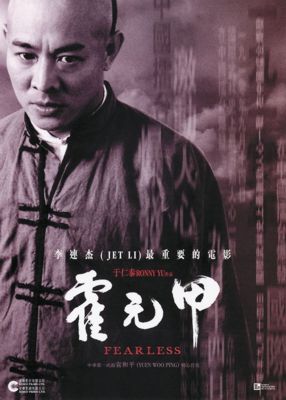
Li reflects, “In the past of my other films, I try to act and be Huang Fei-hong by using my imagination of what I thought these characters would be like, and I basically just did what the directors asked me to do. I never really thought very deep about the character. But this time it was different – undoubtedly from the influence of working on UNLEASHED, where I found a new appreciation for acting, and new methods to put me there. In FEARLESS, Huo is a real martial artist, and he is very close to my philosophy. He died at 42 years old; I made the film at 42. He truly loved martial arts for martial arts sake, and the big thing is that he was the first martial arts master in China that taught wushu as a sport, both physical and mentally.
“In the past I make action films, violence against violence, the physical aspects against physical aspects. This film is different. I use a lot of energy to talk about martial art philosophy, why should we learn martial arts, how to use it in your life and how to use martial arts to help others. This is why this is my last wushu film.
“I play this character, use my heart to play it. It’s really like I’m playing myself. I wanted to keep it real, the real person of Huo Yuan-jia, his real spirit and the spirit of the Ching Woo School. These are the three things that had to be real; the writer and the director created the rest of the story. (laughs) In fact, it’s almost like they were writing about myself from 100 years ago, and so this is why I really didn’t have to act, I just did what I believed I should do, and had belief as to what Huo was doing in the film.”
This actually brings up a very important issue regarding the use of martial arts film as a vehicle for communicating martial arts philosophy. In period piece films, most of us accept the premise that explaining a martial art’s history or philosophy can be done using exposition and the required training sequences, the teacher-student banter and the philosophical poems of righteousness that the hero learns from some mentor. However, when this is done using a contemporary setting, then the film runs the risk of looking like a bad rendition of THE KARATE KID. So if this is indeed Li’s last wushu film, how can he continue in his ambition to promote martial arts philosophy and spread the good word of wushu in modern films without coming across as too preachy? And if he doesn’t plan to continue speaking about martial philosophy in his movies, will he come to miss doing these kinds of films?
“I don’t think I’ll miss doing these kind of films,” Li insists. “I’ve said all that I need to say. In FEARLESS, the director’s cut will be 30 minutes longer, and in that cut, I talk about what is wushu and really try to clarify what it’s all about, and I also address what people continue to argue about — which are the best martial arts: Chinese, Korean, Japanese or what?
“You are right, it is quite difficult to use commercial movies to talk about the traditional Chinese martial art philosophy. If you recall in THE ONE, I tried to talk about one martial art being the circle, the other being straight, together they are a balance, yin-yang…but in the end it was a difficult thing to convey. I will continue to do action films, physical fighting, but not a martial arts film; because without the philosophy, it’s really not a martial arts film…to me.”
That the film lacks any obvious villain is no mistake; according to Yu, the villain exists inside, a part of each of us, and we have a responsibility to subdue it and rise above our nature to show passion and forgiveness. “Everyone has a dark side,” Yu says with foreboding, “and so we all try to find enlightenment, realize our wrongs and find the good. It is the yin-yang. Our lives are not black and white; why should Huo Yuan-jia’s be?”
Gaining international acclaim for BRIDE WITH WHITE HAIR (1993), Yu wowed audiences with his Hollywood-directed films WARRIORS OF VIRTUE (1997), BRIDE OF CHUCKY (1998) and FREDDIE VS. JASON (2003). How has working in Hollywood affected Yu as a filmmaker?
“The ways and techniques of telling a story,” says Yu without hesitation, “and so it can be understood by everyone. Before, I was always fascinated as to how come Hollywood film dominates the world and why has Chinese film become cult films or specialty films. I realized that it’s the storytelling. Cinema language has no barrier; emotions are the same all over the world. And that is the unifying thing of everyone, and that’s the key. In Hong Kong, we are formulaic, calculating that all the elements have to be entertaining. A kid in LA once told me that he loves Hong Kong kung fu films, and when I asked how does he watch them, he told me with a fast-forward button. He wouldn’t do that for STAR WARS, would he? No. It’s because he doesn’t understand the characters, and the characters are not consistent. His answer actually hurt me, because I thought, ‘Oh my God, and we think of ourselves as the masters of action?’ It makes you think.”
With a budget south of $18 million and taking 90 days to shoot (65 days for the fights), FEARLESS is set in 1910, when foreign powers – notably Japan – occupied Shanghai. Li plays real-life hero Huo Yuan-jia, a man who disappears after a personal tragedy. After overcoming depression, he resurfaces to defend the honor of China at a time when Chinese morale was at an all-time low. Of note, Yu’s biggest cinematic hero is Jimmy Wong Yu, and his favorite film is ONE-ARMED SWORDSMAN (1967), so you may notice that film’s subtle influence midway through FEARLESS. Furthermore, even though Yuen Wo-ping was the action director on FEARLESS, when it came to the action, Yu still held the reins and had final say on each camera angle and beat points of the fight. “First of all, Dr. Craig, I am the one that does not understand where does the title of ‘Action Director’ come from,” says Yu. “There is only one director on a film, and on this film, it was me. In the old days of Hong Kong, the directors were either lazy or didn’t understand action, so they’d depend on the fight choreographer for the fights and walk away and have a cup of tea. That is irresponsible filmmaking, and so in my films, I have to be totally involved, and I’m the last one to say ‘yes’ or ‘ no.’ In FEARLESS, the fights were used to develop the character, so in the beginning they were very vicious and violent, but then in the end they were the opposite, because it was about Huo using wushu to help people. Just like Jet tries to do today with his wushu.”
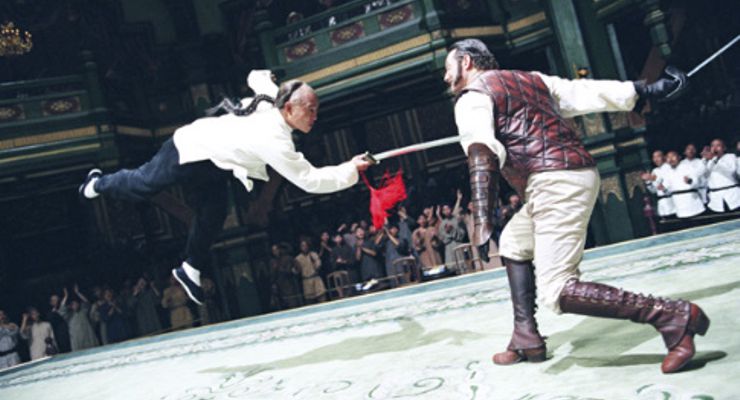
Which comes to a poignant point. Li has success, money, is happily married and has children; and with the inclusion of Tibetan Buddhism in his life, he is now traveling down a path toward either spiritual enlightenment or at the very least trying to develop a spiritual understanding of himself. So what is really left for Li to accomplish in life and in film? Li explains that he used FEARLESS to summarize or conclude his life-long love and passion for wushu, wushu film, wushu philosophy and the philosophy of being a human and how to behave as a human. “After HUO YUAN JIA, I talked with my wife about things,” Li reflects. “I have made all these martial arts films to advertise martial arts and make wushu known. At the same time, I earn money, raise a family, look after my family, make myself famous, and so I cannot deny that any of these are reasons to make films. But I’m 42 now, and I feel I don’t need to continue the responsibility of carrying the wushu banner. What I’m looking for now is true freedom.
“To many people, freedom is freedom of speech or freedom to write what they want. I can do these things. But to me, true freedom is heart freedom, a freedom away from expectations, where the things you do in life do not have ulterior motives. So if you make a film or have a job, you just do your best, which is all you can ask of yourself. Don’t get bogged down in the hope or expectation of things. And so in this way you won’t be disappointed, because ultimately you are not in control of things like box office receipts, or if you get into the Olympics or not. Let everything go; let whatever is going to happen, happen. Things will be whatever they will be.”
Written by Dr. Craig Reid for KUNGFUMAGAZINE.COM
© COPYRIGHT KUNGFUMAGAZINE.COM, ALL RIGHTS RESERVED.
All other uses contact us at gene@kungfumagazine.com






